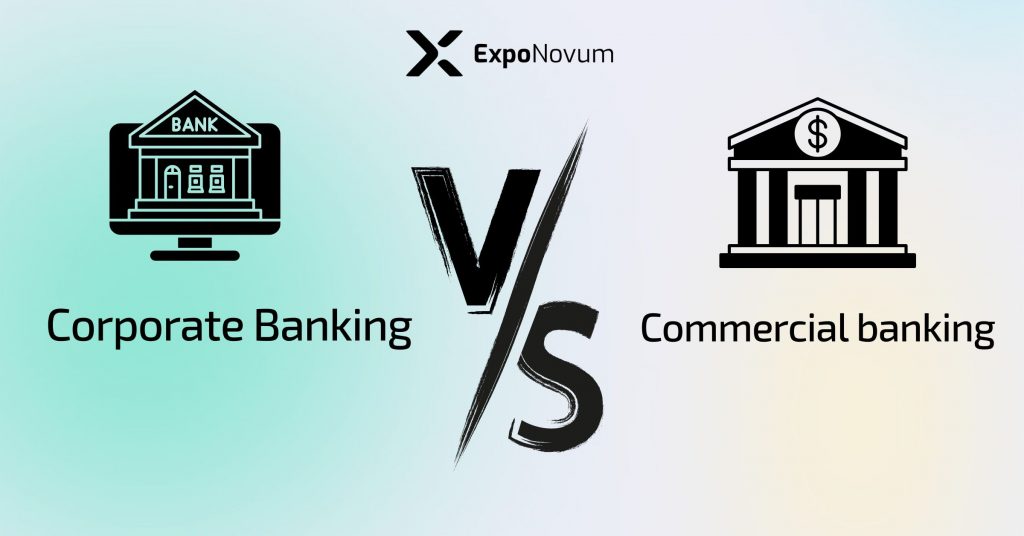Introduction
Running a business is like navigating a treacherous sea, with storms and swells coming at you from all directions. It takes skill, strategy, and most importantly, a trusted partner to help guide you through the choppy waters. That’s where banks come in. They provide the financing, cash management, and other services that businesses need to stay afloat and grow.
But not all banks are created equal. Some specialize in serving large corporations and financial institutions, while others cater to small and medium-sized businesses and individual customers. Understanding the difference between corporate banking vs commercial banking is essential for any business owner or investor looking to make informed financial decisions.
To help shed some light on this topic, let me share with you a personal story of a friend. A few years ago, he started a small software company with his friend. They were excited to turn their passion for technology into a thriving business. However, they quickly realized that they needed financing to purchase equipment, pay salaries, and cover other expenses. They turned to a local bank, thinking that it would be a straightforward process.
To their surprise, the bank presented them with a long list of requirements and restrictions. They wanted collateral, financial statements, and a detailed business plan. The process was overwhelming and time-consuming, and they almost gave up. But they persisted and eventually secured a loan that helped them get off the ground.
Looking back, I realize that they were dealing with a commercial bank that catered to small businesses like theirs. If they had approached a corporate bank that served larger companies, the requirements and process would have been even more complex and demanding.
That’s why it’s crucial to understand the differences between corporate banking and commercial banking. In this blog post, we’ll explore the characteristics, services, and advantages of each type of bank. We’ll also discuss the factors to consider when choosing between them and share some tips on how to build relationships with banks. So, buckle up, and let’s set sail on this journey of discovery!

Corporate banking
Corporate banking is a specialized banking service that offers a wide range of financial products and services for large corporations, financial institutions, and multinational companies. The personalized approach and tailored solutions that corporate banks provide make them ideal for clients with unique financial needs. However, corporate banking services are complex and come with higher fees and stricter requirements, making them more suited for large corporations that require sophisticated financial solutions.
Commercial Banking
Commercial banking services are designed to cater to the financial needs of small and medium-sized businesses. These services include deposit accounts, loans, credit cards, and lines of credit, which are tailored to the specific needs of small and medium-sized businesses. Commercial banks provide a personalized approach to their clients and are accessible to a wide range of businesses, regardless of their size or industry.

Corporate Banking vs Commercial Banking
While both corporate and commercial banking services cater to the financial needs of businesses, there are significant differences between the two. Here are some points to include to provide more detail on the differences between corporate and commercial banking:
Target Clients
The target clients for corporate and commercial banking services are different. Corporate banking primarily serves large corporations with complex financial needs, while commercial banking caters to the needs of small and medium-sized businesses.
Financial Needs
Large corporations have different financial needs than small and medium-sized businesses. Corporate banking services are designed to handle complex transactions, such as large-scale mergers and acquisitions, corporate lending, and underwriting securities, while commercial banking services focus on day-to-day banking needs, such as deposit accounts, loans, and credit cards.
Level of Expertise
Corporate banking requires a higher level of expertise than commercial banking. Corporate bankers are specialized in handling complex financial transactions and have a deep understanding of corporate finance, investment banking, and capital markets. Commercial bankers have a more general understanding of financial products and services, as they primarily deal with the day-to-day banking needs of small and medium-sized businesses.
Financial Products and Services
Corporate banking services offer a range of financial products and services that are not typically available in commercial banking, such as capital markets, foreign exchange services, and trade finance. Commercial banking services, on the other hand, offer deposit accounts, loans, credit cards, and lines of credit that are tailored to the needs of small and medium-sized businesses.
Deal Size
The size of transactions in corporate banking is much larger than in commercial banking. Corporate banking deals with large transactions, such as multi-billion dollar mergers and acquisitions, while commercial banking typically deals with transactions of smaller sizes.
Risk Management
Risk management is a critical component of corporate banking services. Corporate bankers are specialized in analyzing and managing the risk associated with large and complex financial transactions. Commercial banking services also manage risk but primarily focus on the credit risk associated with small and medium-sized businesses.
Fees and Costs
Corporate banking services are typically more expensive than commercial banking services. The fees and costs associated with corporate banking are higher due to the specialized services provided and the higher level of expertise required. Commercial banking services are more affordable and accessible to a wider range of businesses.
Relationship Management
Relationship management is a critical aspect of corporate banking. Corporate bankers work closely with senior management teams and key decision-makers to understand their unique financial needs and develop customized financial solutions. In contrast, commercial bankers focus on building long-term relationships with small and medium-sized business owners to provide them with the financial products and services they need to grow and succeed.
Geographical Scope
Corporate banking services are typically more geographically diverse than commercial banking services. Large corporations often have operations in multiple countries and require financial services that can be seamlessly integrated across different regions. In contrast, commercial banking services are primarily focused on providing banking services to businesses within a specific geographical area.
Legal and Regulatory Requirements
Corporate banking services are subject to a more complex set of legal and regulatory requirements than commercial banking services. Large corporations have complex financial structures and require specialized financial services that must comply with a wide range of legal and regulatory requirements. Commercial banking services are subject to a less complex set of legal and regulatory requirements as they primarily deal with small and medium-sized businesses.
Technology and Innovation
Corporate banking services are more technologically advanced than commercial banking services. Large corporations require sophisticated financial services that can be integrated into their existing financial systems. As a result, corporate banking services are often at the forefront of technological innovation, such as mobile banking, artificial intelligence, and blockchain technology. In contrast, commercial banking services are more focused on providing basic banking services and may not be as technologically advanced as corporate banking services.
Risk Appetite
Corporate banking services have a higher risk appetite than commercial banking services. Large corporations have complex financial structures and require financial services that can manage and mitigate their unique financial risks. As a result, corporate banking services are more willing to take on higher levels of risk in their financial transactions. In contrast, commercial banking services have a lower risk appetite and focus on providing basic banking services with minimal risk.
In summary, corporate and commercial banking services cater to different clients with different financial needs. Corporate banking serves large corporations with complex financial transactions, while commercial banking caters to small and medium-sized businesses’ day-to-day banking needs. Corporate banking requires a higher level of expertise and provides a wider range of financial products and services. The size of transactions and the level of risk management also differ between the two. Finally, corporate banking services are typically more expensive than commercial banking services, which are more affordable and accessible to a wider range of businesses.

Choosing between corporate and commercial banking
When it comes to choosing between corporate and commercial banking, businesses must consider a range of factors to ensure that they select the right financial services to meet their unique financial needs. Here are some key factors to consider when choosing between corporate and commercial banking:
Business Size
One of the most critical factors to consider is the size of the business. Large corporations with complex financial structures and global operations require more specialized financial services that are typically provided by corporate banks. In contrast, small and medium-sized businesses may find that commercial banking services are more suited to their financial needs.
Financial Needs
Another crucial factor to consider is the specific financial needs of the business. Corporate banking services are designed to provide complex financial services such as corporate finance, investment banking, and treasury services to large corporations. In contrast, commercial banking services are primarily focused on providing basic banking services such as checking accounts, loans, and credit facilities to small and medium-sized businesses.
Industry
Different industries have different financial needs. For example, businesses in the technology industry may require more sophisticated financial services than businesses in the retail industry. Corporate banks often specialize in specific industries and may be better equipped to provide financial services tailored to the unique needs of the industry.
Geographical Reach
If a business has global operations, it may require financial services that can be seamlessly integrated across different regions. In this case, corporate banking services may be better suited to their needs, as they typically have a more extensive global reach than commercial banking services.
Risk Appetite
Businesses with a high-risk appetite may require financial services that are more willing to take on higher levels of risk. In this case, corporate banking services may be better suited to their needs, as they often have a higher risk appetite than commercial banking services.
Relationship Management
Relationship management is another critical factor to consider when choosing between corporate and commercial banking services. Corporate banks often work closely with senior management teams and key decision-makers to develop customized financial solutions tailored to the specific needs of the business. In contrast, commercial banks focus on building long-term relationships with small and medium-sized business owners.
Legal and Regulatory Requirements
Large corporations have complex financial structures and require specialized financial services that must comply with a wide range of legal and regulatory requirements. Corporate banking services are subject to a more complex set of legal and regulatory requirements than commercial banking services. In contrast, commercial banking services are subject to a less complex set of legal and regulatory requirements as they primarily deal with small and medium-sized businesses.
So, Which Banking Service To Choose For High Risk Business?
When it comes to choosing between corporate banking and commercial banking services for a high-risk business, it’s important to consider the specific needs and circumstances of your business. Corporate banking may be better equipped to manage the unique risks associated with high-risk industries, but commercial banking services may be more accessible to smaller businesses. Ultimately, it’s important to do your research and shop around to find a banking service that meets your specific needs and offers reliable and accommodating financial services.
Bottom Line
In conclusion, corporate and commercial banking services serve different business needs and financial goals. Corporate banks offer specialized financial services to large corporations, while commercial banks cater to the banking needs of small and medium-sized businesses. Businesses should choose banking services that meet their specific financial needs, industry, geographical reach, risk appetite, relationship management, and legal and regulatory requirements.
Choosing the right banking services is crucial for the long-term financial success of a business. By selecting the right banking services, businesses can access the financial services that meet their unique needs, build strong relationships with their banks, and ensure compliance with legal and regulatory requirements. Ultimately, the right banking services can help businesses achieve their financial goals and grow their operations.
Whether a business chooses corporate or commercial banking services, it is important to work closely with their banks and build a strong relationship. By understanding their banking needs and goals, businesses can work with their banks to develop customized financial solutions and achieve long-term financial success.